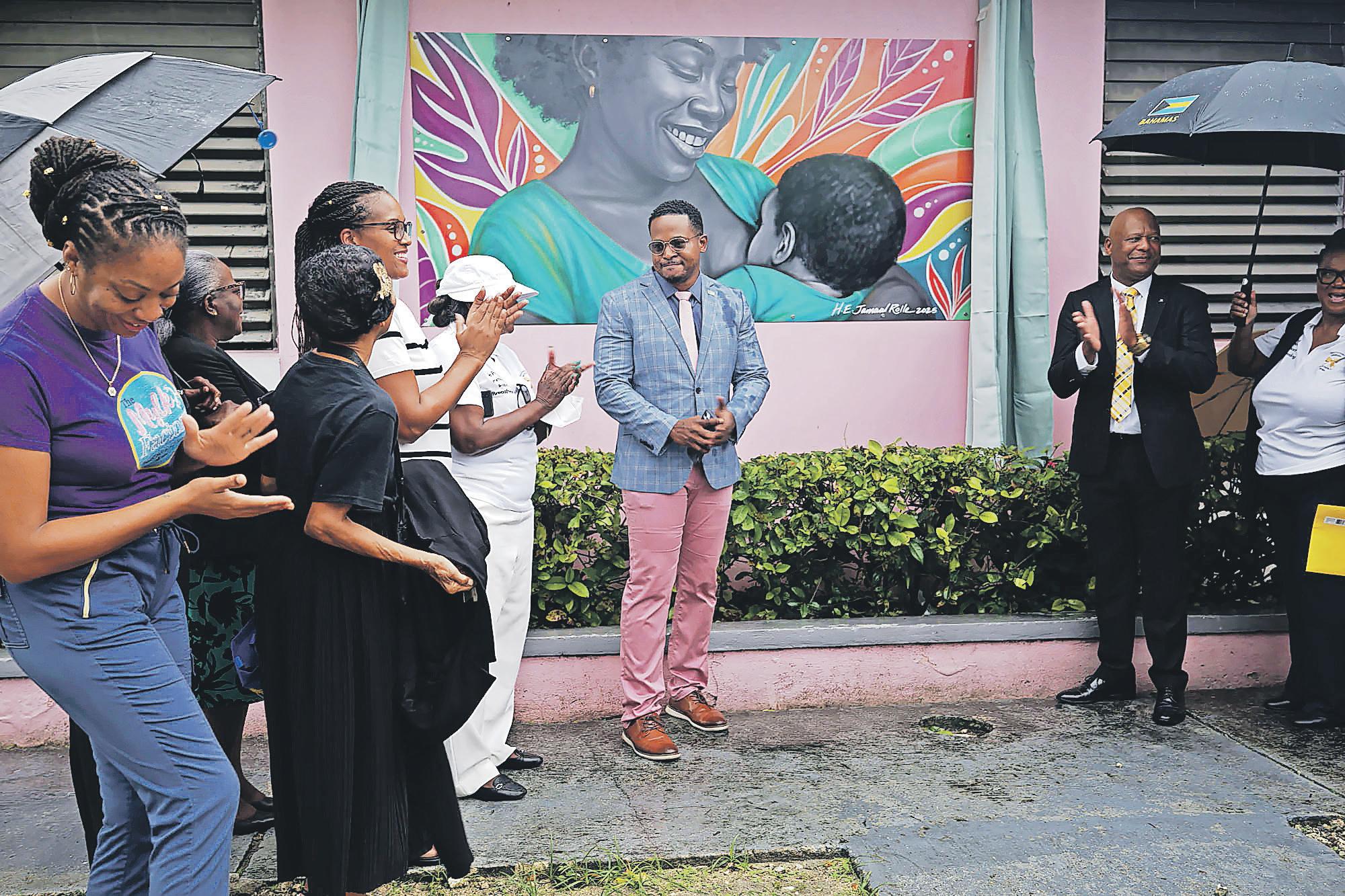BREAST CANCER GUIDE

















Davis tells supporters now not the time for politics but ‘stay ready’
By RASHAD ROLLE Tribune News Editor
rrolle@tribunemedia.net
PRIME Minister Philip
“Brave” Davis urged Progressive Liberal Party supporters last night to “stay alert, stay ready, and stay faithful.”
His comment came as some within his party debate whether he should call an early general election
rather than proceed with a by-election in Golden Isles following the death of MP Vaughn Miller. Speaking during the PLP’s “Southern Link-Up” rally last night, Mr Davis acknowledged the questions swirling among members about the future but said now is not the time for politics. “I know many of you
RESIDENTS VOICE FLOODING FEARS OVER NEW HOSPITAL
By ANNELIA NIXON
Business Reporter
anixon@tribunemedia.net
HOMEOWNERS and residents last night argued that recent flooding from Tropical Storm Imelda shows why Perpall Tract is


A MAN in his 20s was shot and killed by gunmen outside his home in Seabreeze last night.
Chief Superintendent Sheria King told reporters the fatal shooting occurred around 8pm on Concha Road, off Seabreeze Lane.
She said the victim had just arrived at his residence when a dark Japanese vehicle pulled up and its occupants opened fire, fatally wounding him.
CSP King said police do not yet know the motive for the killing.
When asked about a video purportedly circulating online that reportedly shows the victim being ambushed by gunmen, she said she could not confirm it was connected to the
$7m hospital to be first private facility built on Family Island
By LYNAIRE MUNNINGS Tribune Staff Reporter lmunnings@tribunemedia.net
RESIDENTS of Eleuthera marked a milestone today with the opening of Eleuthera Wellness Hospital, the first private hospital to operate on a Family Island.
Located in Palmetto Point, the $7 million, fivebed acute care facility also includes a six-bed urgent care emergency room equipped for advanced cardiac and trauma life support. While round-the-clock hospital services begin on

By DENISE MAYCOCK Tribune Freeport Reporter
A GRAND Bahama electrician was killed after being struck by a bus while walking along Coral Road on Sunday night, pushing the island’s traffic death toll to nine for the year.
Police said officers were called to the scene shortly after 8pm following reports of a collision involving a vehicle and a male pedestrian. The victim, identified as Warren Clarke, 54, sustained severe injuries and was taken to

have questions tonight about what comes next,” he said. “But for now, I want you to do one thing: stay alert, stay ready, and stay faithful. Because when the time comes, and it will come, you will hear from me. But tonight is not a night for politics. Tonight, we reflect on where God brought us and continue the fight in honour of our brother’s life, his service, and his example.”
When an MP dies in The Bahamas, the Speaker notifies the Governor General, who by law must issue a writ for a by-election within 60 days of the vacancy. The law also requires that the election be held no sooner than 21 days and no later than 30 days after the writ is issued.
Mr Davis’ comments come amid growing anticipation over how the party will fill the Golden Isles seat. While a by-election is constitutionally required and the widely anticipated route, some PLPs privately call for an early general election, arguing a byelection loss would kill the
party’s momentum heading into a general election.
They acknowledge the headwinds the party could face in the constituency, where voters have expressed frustration over the quality of their representation in recent years.
Joe Johnson, head of the party’s men’s branch, believes their frustration is “legitimate”, and insisted yesterday that the PLP can win again if it chooses the right candidate — himself.
Mr Johnson said his longstanding ties to the area make him best positioned to restore voter confidence as residents complain of being overlooked.
“For me, it is not an uphill battle if the right candidate is chosen because we know what the people want, and the government in power has the machinery to satisfy the people of the entire nation,” he said. “We may not be perfect, but we make progress.”
He said he has lived in the constituency for about 15 years and runs a restaurant in Adelaide employing mostly Golden Isles residents.
“The pain that Golden
Isles feels will be the pain that I feel because I am a resident,” he said. “So when I speak for Golden Isles, I speak for my nineyear-old son who was born in Golden Isles. So I’m not just fighting for the people, I’m fighting for my family.”
Mr Johnson said he was also an aspirant in 2021 before Mr Miller was reselected by the party and went on to win the seat.
Describing himself as “a party man,” he said he has “major machinery behind me if, in fact, it’s me or not me, prepared to invade Golden Isles to continue to be PLP.”
Nonetheless, party insiders say Senator Darren Pickstock is the frontrunner for the nomination, enjoying support from several senior figures. Mr Pickstock confirmed his interest, telling reporters: “I am ready to take the charge.”
Another hopeful,
D’Asante Small, has also expressed interest. The FNM’s Brian Brown, the party’s ratified candidate for the general election, is expected to represent the party should it participate in a by-election.



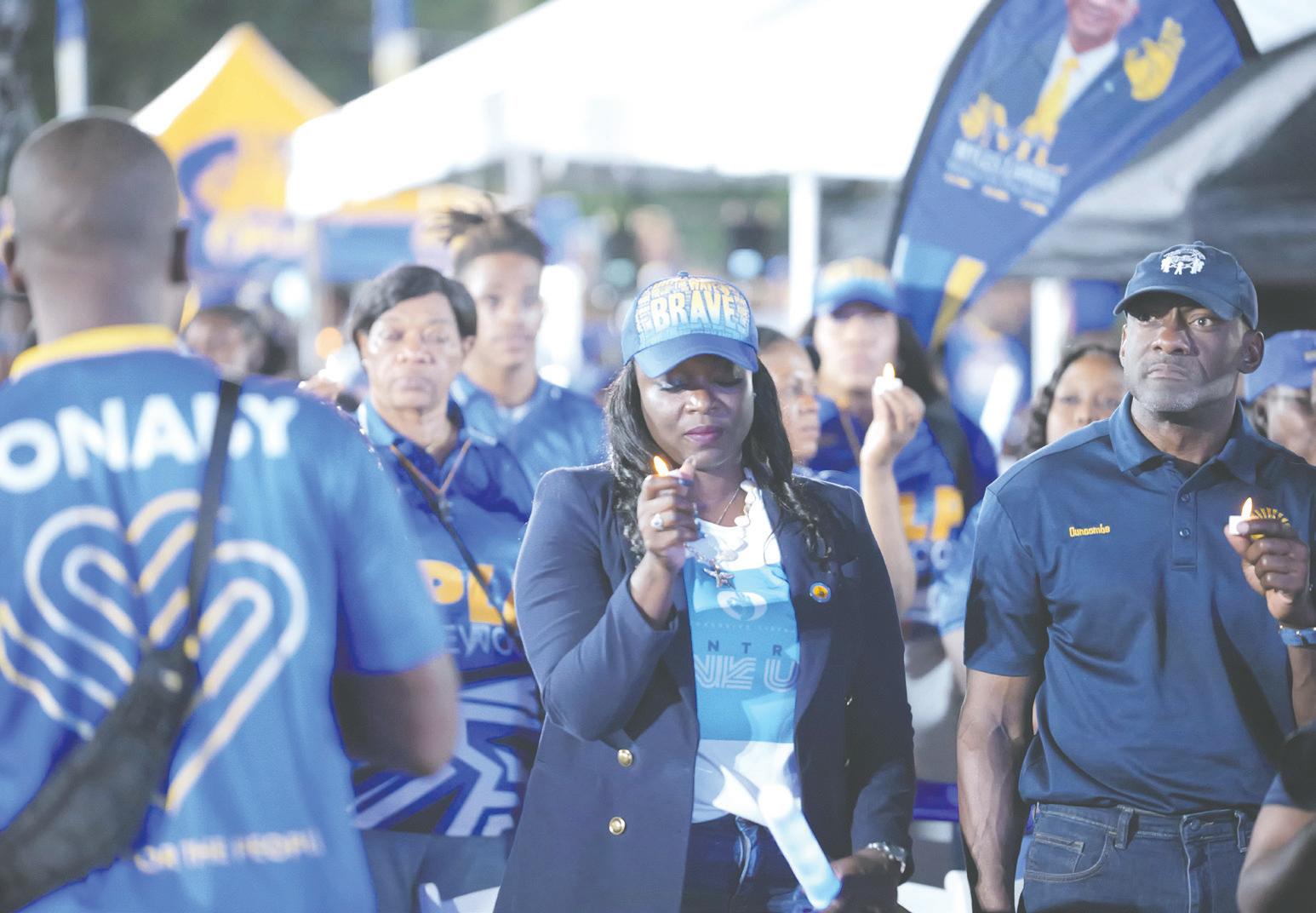
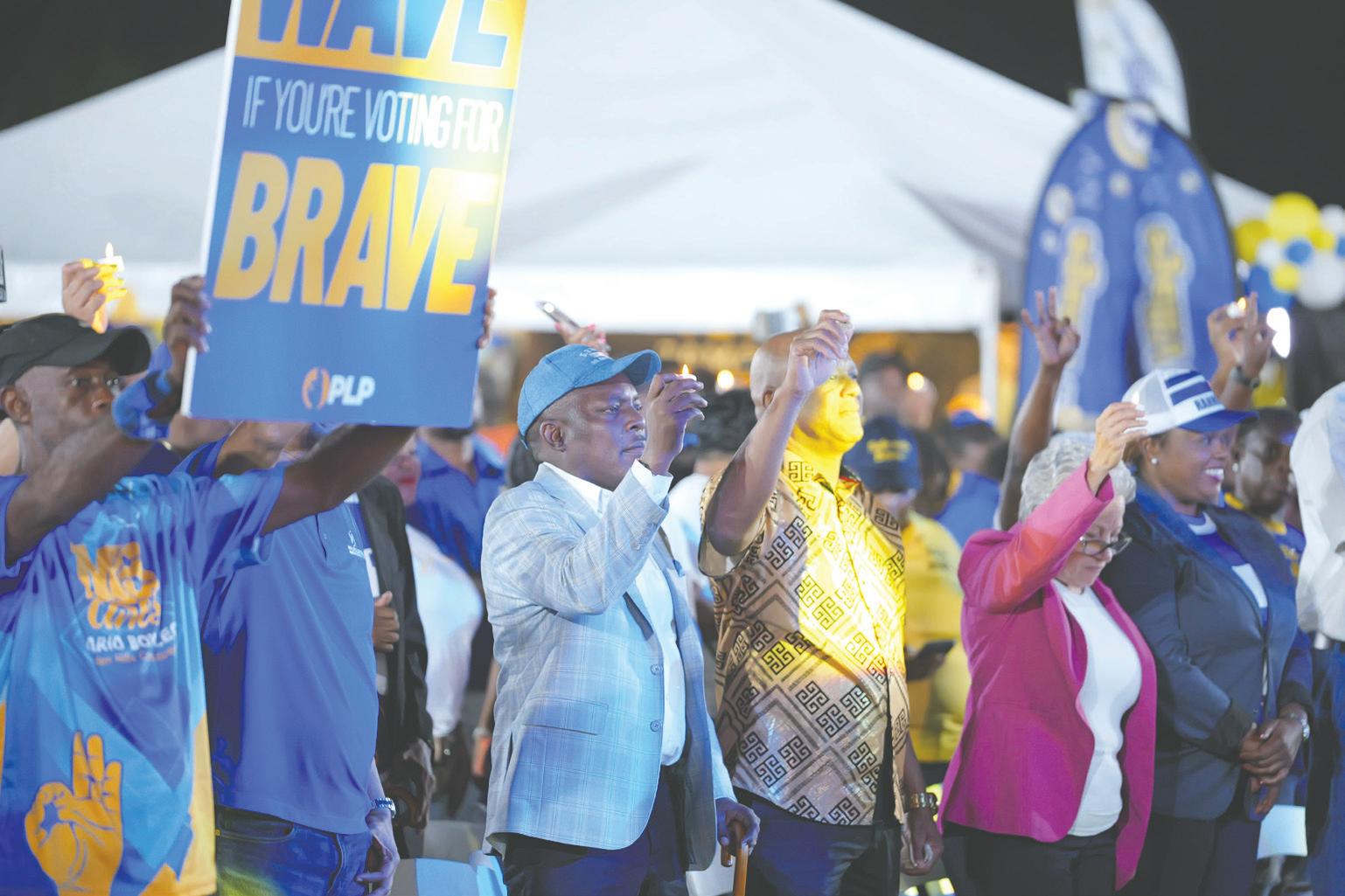


HOSPITAL from page one
December 1, urgent care opens today and will operate daily until 9pm.
The new hospital is part of the Bahamas Wellness Health System, founded in 2016 by Dr Arlington Lightbourne, which now operates clinics in New Providence, Spanish Wells, Palmetto Point, and South Eleuthera, as well as parttime in Lower Bogue.
Dr Lightbourne described the opening as a milestone for Eleuthera and a model for future healthcare development in the Bahamas. He said the expansion ensures care is closer and more comprehensive, particularly for children and the elderly who once had to travel offisland for treatment.
The facility currently employs about 40 staff members, with plans for expansion. It offers emergency and urgent care, advanced diagnostics including CT scanning, and inpatient services. Full hospital operations, including
surgical and blood-banking capabilities, are expected to begin when 24-hour service starts next month.
Residents welcomed the hospital as a long-awaited addition to the island.
“God sent,” said Sonia Sands, who praised the convenience and cost savings of receiving advanced care locally. Ricardo Dean called it a source of pride for the community, noting its impact on everyday healthcare access.
Charles Sealy, chairman of Bahamas Wellness Hospital and Clinics, said the facility addresses a long-standing need for accessible, high-quality care on Eleuthera. He said it is designed to support timely treatment for families and the elderly while strengthening community health partnerships.
Bahamas Wellness has also partnered with two air ambulance services — MASA for emergency flights to Nassau and JetICU for transfers to the United States — to enhance emergency response options.

By KEILE CAMPBELL Tribune Staff Reporter
kcampbell@tribunemedia.net
SPOUSE of the Prime Minister Ann Marie Davis says her office will expand access to a wider range of menstrual products across the country amid growing calls for affordability and choice.
Mrs Davis made the announcement after the launch of the D6 Project documentary earlier this week, saying efforts are underway to introduce menstrual cups and period underwear to better meet the needs of women and girls.
“Absolutely, I agree we do need some more
diversity,” she said. “We definitely need the menstrual cups and the underwear.”
She explained that her office is considering the new options to accommodate different users, from students involved in school swimming programmes to elderly women in care facilities. She said period underwear, in particular, would be better suited for older women and promote dignity in personal care.
“The underwear will be more conducive to the elderly in their homes,” Mrs Davis said. “We have to be dignified in everything we do. We have to have the proper supplies and be well
MURDER from page one
incident.
CSP King also cautioned people against sharing sensitive information, noting that it could jeopardise the investigation.
“I always say, put yourself in the family of this victim. They are looking for justice, and this, as I said, can impede, can compromise the investigation of police,” she said.

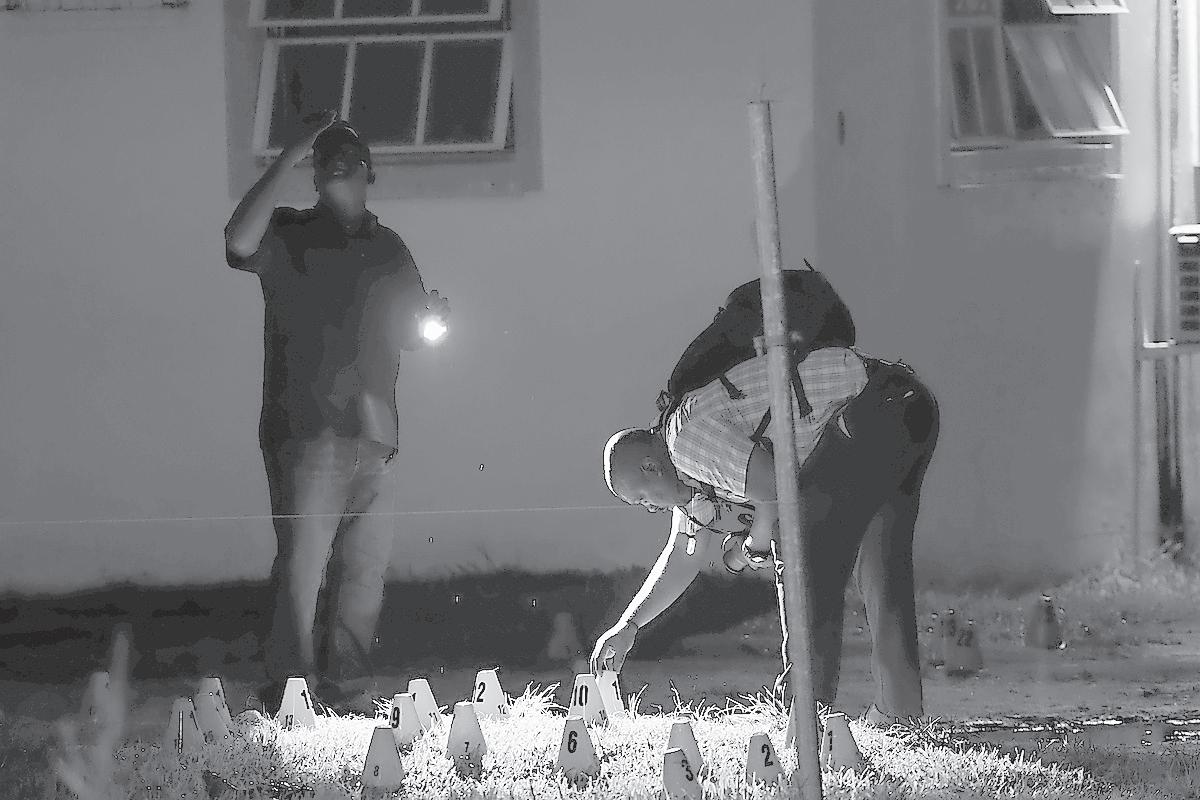
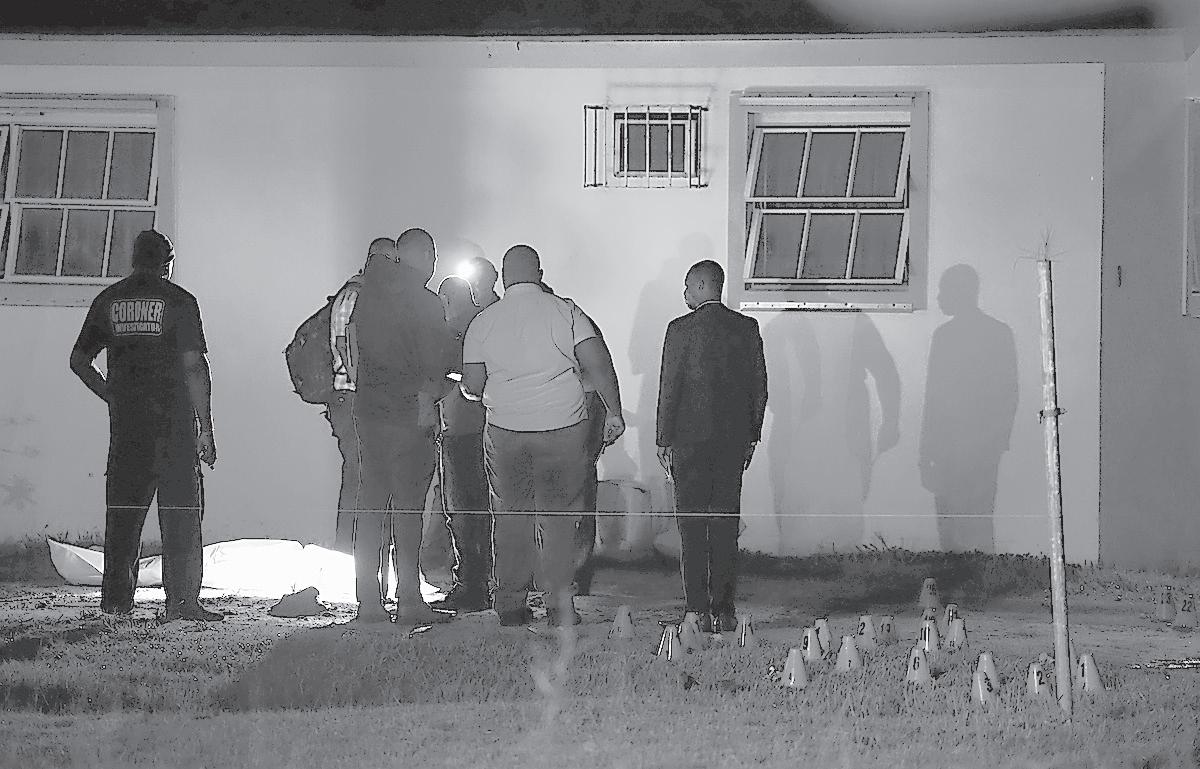
prepared for all the different occasions that face us. Our young ladies and women must be given the choice of what is better for them.”
The renewed focus follows mounting advocacy from Equality Bahamas, which last week urged the government to tackle the high cost and limited variety of feminine hygiene products. The group, led by Alicia Wallace, recommended tax exemptions, local manufacturing, and greater availability of reusable alternatives such as cups and period underwear. Mrs Davis previously launched a national feminine hygiene product distribution
initiative through her office in June. At that launch, she described menstrual health as a matter of equality and dignity, saying access to sanitary items “is not a privilege, but a fundamental right.”
She said her office continues to receive widespread requests for more assistance and plans to ensure women, regardless of income or location, have access to affordable menstrual supplies and the ability to choose what works best for them.
“We have to diversify in how we prepare ourselves,” Mrs Davis said. “We are diversifying in every other way, and we have to do the same for menstrual care.”




By KEILE CAMPBELL Tribune Staff Reporter kcampbell@tribunemedia.net
A DOCUMENTARY
exposing the lingering emotional scars of Hurricane Dorian and the COVID-19 pandemic will premiere on October 18 at the Atlantis Theatre on Paradise Island.
Titled “D6 Project: We Are Not Okay,” the film — created by Bahamian journalist and filmmaker
Dr Juliette Storr — examines the long-term trauma experienced by survivors and urges a national reckoning with mental health in the wake of back-to-back crises.
Dr Storr said she was driven to make the film after volunteering with Dorian survivors and witnessing “a deeper suffering that went unspoken.”
“I could not begin to explore this without the help and expertise of the Bahamas Psychological Association,” she said. “I saw the pain that remained long after everyone else had packed up and left.

People may look fine on the outside, but inside, they are not.” The documentary is the first in a planned three-part series under the Category D6 banner,
which links storytelling with calls for stronger national mental health policy.
Ann Marie Davis, spouse of the Prime Minister and patron of the
project, said mental health remains a priority of her office and encouraged Bahamians to seek help when struggling.
“Seeking help is a sign of strength, not weakness,”
Mrs Davis said. “Sometimes people just want to talk and need a listening ear. We are saying that it is okay not to be okay.”
The Bahamas Psychological Association (BPA) served as a principal partner, providing clinical guidance and ongoing support through its members across the Family Islands.
BPA President Dr Wendy Fernander said the partnership gave Bahamian professionals a chance to tell their own stories of how communities continue to cope five years after Dorian.
The film has already earned eight international awards, including Best Documentary at the London Independent Film Awards and Gold at the New York Cinemafest.
Film editor Justin Williamson said the project took more than two years and over 100 hours of footage to complete, calling it a sobering experience that changed his perspective on Dorian’s impact.
“As someone living in
Nassau, I did not truly understand the magnitude of what happened until I heard their stories,” he said. “After that, I became even more passionate about the project because I realised the event happened and then we just forgot about it. What happened during Dorian should be treated the way America treats 9/11. We should never forget that day.”
Mr Williamson said the film’s message goes beyond remembrance, underscoring the importance of sustained mental health awareness and preparedness for future climate disasters.
“This project is something that should not only be shown on October 18 but for generations to come,” he said. “It reminds us that there is still work to do, and that we must take mental health and climate change seriously.”
Tickets for the premiere range from $25 to $95 and are available through ticketboxevents.com.
By RASHAD ROLLE Tribune News Editor
THE Court of Appeal upheld KFC’s decision to fire a Marathon Mall assistant manager caught on surveillance footage giving away food and a “cold pack” of chicken to a former employee waiting in the parking lot. The footage, shown to both the employee and her union representatives, captured Shakara Ellis taking the cold pack from a cooler, placing it in a brown paper bag, walking out the back door, and handing it to ex-employee
Donavan Ennis. She then instructed the restaurant’s security guard to deliver more food to Ennis while he sat in his car outside. Ms Ellis claimed she was simply following her manager’s instructions and thought the giveaway was harmless, noting the former employee had been allowed to collect cold packs from the restaurant for about 20 years. She said the food had expired and had no resale value. But the company called it theft, and the Industrial Tribunal agreed, finding that her actions violated written policies that explicitly warn
managers against “undercharging or giving away product,” offences listed as grounds for immediate dismissal.
In a ruling delivered by Chief Justice Sir Ian Winder, the Court of Appeal found that KFC had conducted a proper investigation and that Ellis’ firing was both fair and lawful.
The judges said Ms Ellis and her union representatives were given multiple opportunities to view the footage and respond to the allegations, including during a November 19 2021 meeting that would determine whether she
kept her job. On her representatives’ advice, she stayed silent.
“What is curious is why the Applicant would have been told to say nothing on her own behalf in a meeting that would determine her fate,” the Industrial Tribunal vice-president wrote in her decision, a remark the appeal court cited with approval.
The tribunal also noted that Ms Ellis had undermined her own case: she had submitted a set of internal reports as part of her evidence that, in fact, proved KFC’s investigation was thorough. “To now seek to challenge
the contents of her own Bundle of Documents is curious,” the vice-president wrote. Her story also shifted over time. In her written statement, Ms Ellis claimed one manager authorised her to give away the cold pack; under cross-examination, she insisted it was someone else. The tribunal said those contradictions damaged her credibility.
Ms Ellis’ lawyers, led by King’s Counsel Obie Ferguson, argued that her dismissal was unfair, that she was treated harshly over a trivial issue, and that she should have been paid overtime. But the appeal
court rejected all 18 of her grounds of appeal, finding that most were factual disputes it could not review under the Industrial Relations Act.
It agreed that, as a supervisor, Ms Ellis was excluded from overtime pay and that the company had acted within its rights to summarily dismiss her.
“The Respondent had conducted a reasonable investigation and reasonably believed that Ellis had indeed committed the misconduct complained of,” Chief Justice Winder wrote. The appeal was dismissed in full, with no order as to costs.
By RASHAD ROLLE Tribune News Editor
THE Supreme Court has struck out Captain Joseph Moxey’s lawsuit against Bahamasair over the airline’s decision to retire him at 60, but allowed co-claimant Captain Fran Rahming to press ahead with his own challenge.
Acting Registrar Renaldo Toote ruled that
Mr Moxey’s case was barred by res judicata, the legal principle that forbids re-litigating an issue already decided, because courts had previously ruled that Bahamasair’s retirement age for pilots remains 60, not 65.
Mr Moxey, who lost an earlier lawsuit and subsequent appeal, filed the new claim with Mr Rahming last year, arguing both men were unfairly forced to retire despite
aviation regulations permitting pilots to fly until 65. They based the claim on a 2023 industrial agreement, saying it differed from the one used in the previous case.
But Mr Toote said the new action was “a repackaged” attempt to reopen the same failed argument under a different guise.
“For him to pursue the current claim would represent a collateral attack on that decision,” the
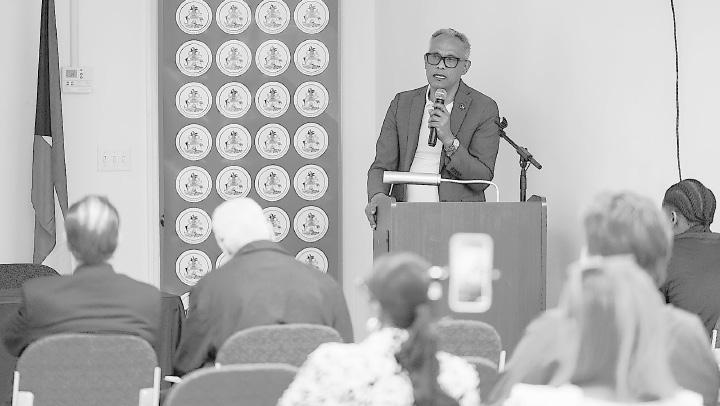

Registrar wrote, calling the filing “cosmetic differences” meant to skirt a final judgment.
He struck out Mr Moxey’s case in full, set aside a default judgment that had briefly gone in his favour, and ordered him to pay $5,000 in costs to the airline.
However, Mr Toote said it would be unjust to bar Mr Rahming’s case, as he was not a party to the previous litigation.
“Every litigant is entitled to their day in court,” he said, allowing Mr Rahming’s challenge to proceed while noting he faces “significant evidentiary and legal challenges” given that earlier rulings confirmed Bahamasair’s right to retire pilots at 60.
Bahamasair’s attorney, Lakeisha Strachan-Hanna, argued that both the 2018 and 2023 industrial agreements were unregistered and therefore had no legal effect under the Industrial Relations Act. Mr Moxey’s lawyer, E. Raphael Moxey, contended that the new agreement and Mr Rahming’s inclusion made this a distinct claim, but Mr Toote disagreed, saying the “core issue” remained the same — whether Bahamasair could compel its pilots to retire at 60 despite regulatory changes.
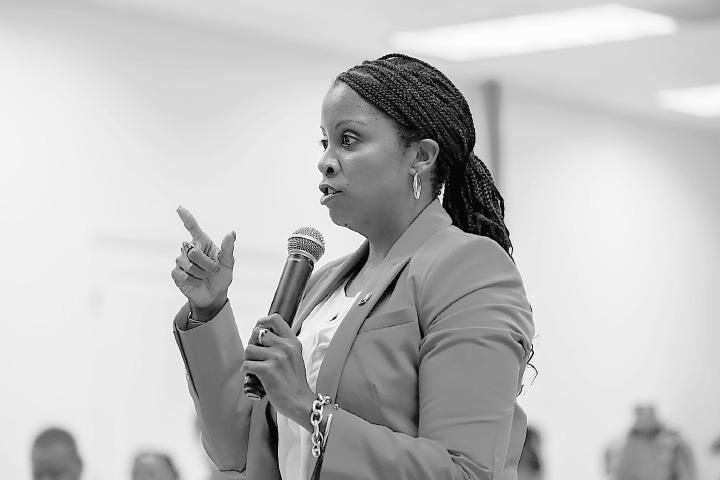


By LYNAIRE MUNNINGS Tribune Staff Reporter lmunnings@tribunemedia.net
THE Department of Labour is investigating The Cricket Club Restaurant and Pub after social media allegations accused the well-known West Bay Street establishment of unsafe working conditions, unpaid wages, and verbal abuse of staff.
Senior Deputy Director of Labour Patrenda Russell-Brice, who is acting as director, confirmed that inspectors will visit the restaurant to assess the claims, which have drawn public attention since a viral Facebook post surfaced over the weekend. She said that even though no formal complaints were filed, the department decided to act after seeing the allegations circulate widely online..
Owner Connie Robinson said the restaurant will close today to allow a full inspection.
“We are here every day, so we want to know what the situation is and what the allegations is and
what’s the problem,” she said.
Online posts described the popular restaurant as a “nightmare” behind its public image. It accused Ms Robinson, her daughter Dominique, and sister Tammy of running a toxic workplace where employees are overworked, underpaid, and mistreated. Unverified claims include staff beginning work as early as 6am, staying late into the evening without pay, and being denied lunch breaks. The post claimed they receive no payslips or overtime pay, often work seven days a week, and risk losing pay if they fall ill or take time off.
It also described filthy and hazardous conditions inside the restaurant, including leaking roofs, rats in the kitchen, and bathrooms so unsanitary that servers are allegedly forced to clean them because management refuses to hire cleaners.
The post further alleged that management arguments sometimes turn
physical in front of staff and customers.
Workers also claimed their wages were paid in cash and “came up short,” that credit card tips were not fairly shared, and that employees with children were criticised for leaving at the end of their shifts.
The post called the situation “systematic abuse” and appealed for government intervention.
Ms Russell-Brice said her department acts on complaints regardless of how they are received.
“If the Department of Labour’s name is called and what have you, and even if not, an investigation will be sent out,” she said. “We get a lot of anonymous complaints. Once we’re made aware of certain things, then we act on that.”
She added that while the department enforces the Employment Act, it also works to educate employers who may not fully understand their legal obligations.
“Sometimes a lot of enterprises, they’re not

familiar with the law, the Employment Act, and what have you,” she said. “It’s then the duty of the department to educate employers on certain gaps. We’re to educate the employer.
We’re not for one side.
We’re for everybody.”
Officials said today’s inspection will include interviews with staff and management. If breaches of the Employment Act are
confirmed, the department could direct the restaurant to correct them, though Ms Russell-Brice emphasised that the focus will be on compliance and education rather than punishment.
from page one
Rand Memorial Hospital, where he later died.
The tragedy brings the national road fatality count to 51 for the year.
Mr Clarke’s sister, Raquel Jones, said the family is heartbroken.
“We are still trying to process this news and
everybody is in shock and disbelief,” she said. Despite their grief, Ms Jones said the family is holding on to the memories of a man known for his vibrant personality and dedication to his trade.
“He was the kind of person who liked to have fun. When he showed up, you knew he was there,” she said. “He was also a
very good electrician who was well known in the community for his work ethic.”
Ms Jones said doctors fought to save her brother’s life after he was admitted in critical condition but were unable to.
“We were hoping that he would make it, but later that night he succumbed to his injuries,” she said.
She added that the family
By RASHAD ROLLE
Tribune News Editor
rrolle@tribunemedia.net
THE government says the Bahamas Electronic Medical Records+ (BEMR) system will be fully rolled out across the country by the end of 2025, a move officials describe as one of the biggest overhauls of the public health system in decades.
Health Minister Dr Michael Darville said the nationwide launch will connect every public clinic and hospital to a secure digital network, replacing the paperbased system still used in most facilities. The goal, he said, is to ensure that “one patient, one record” follows Bahamians wherever they receive care.
“The rollout of BEMR nationwide is a gamechanger for healthcare in The Bahamas,” Dr Darville said. “By ensuring that every Bahamian can benefit from modern, connected healthcare services, we are not only
increasing efficiency but also putting patients at the centre of the system.”
The project builds on pilot runs at the Adelaide and Gambier clinics earlier this year, which officials said improved accuracy, reduced duplication, and made patient histories instantly available to medical teams.
Supported by the Pan American Health Organization and the Inter-American Development Bank, the system forms part of the wider Information Systems for Health (IS4H) initiative to modernise national health data.
Once completed, the platform will link more than 80 government clinics and hospitals, including those in remote Family Islands, giving doctors instant access to patient information and allowing island residents to consult specialists in Nassau and Grand Bahama through telehealth.
Still, the government has not released key
details about how the transition will unfold, including when each clinic will be brought online, how millions of paper records will be digitised, or what cybersecurity protocols will protect patient data.
Dr Phillip Swann, director of public health, has said the rollout will take place in phases in collaboration with local health workers and technology partners. “This demonstrates the government’s commitment to building a stronger, more resilient, accessible and patientcentred health system for the future,” he said.
The initiative is being financed through a $40m IDB loan that supports upgrades to Family Island clinics, digital infrastructure, and staff training. Officials said training for medical and administrative workers will begin this quarter as the system expands clinic by clinic.
If the plan stays on schedule, The Bahamas will join a growing list of Caribbean countries
is drawing strength from their faith as they cope with the loss.
“God had other plans,” she said. “We have to hold on to His strength and wisdom to get through this.”
Mr Clarke, a father-ofone, is being remembered as a skilled tradesman and familiar face on the island, with many expressing condolences on social media.
Police said speed has been a factor in several of Grand Bahama’s recent fatal crashes. In January, a 14-monthold baby was killed in a three-vehicle collision on Queen’s Highway. In May, a woman died in Eight Mile Rock after her car collided with a police vehicle responding to another incident. In August, two men and a 13-year-old boy were killed in separate crashes, and in September, a motorcyclist died on East Sunrise Highway. Authorities are again urging motorists to slow down and stay alert as investigations into Clarke’s death continue.

shifting to electronic medical records, a move international health experts say is crucial to improving efficiency, cutting costs, and reducing errors across public health systems.


NULLIUS ADDICTUS JURARE IN VERBA MAGISTRI
“Being Bound to Swear to The Dogmas of No Master”
LEON E. H. DUPUCH
Publisher/Editor 1903-1914
SIR ETIENNE DUPUCH, Kt., O.B.E., K.M., K.C.S.G., (Hon.) LL.D., D.Litt .
Publisher/Editor 1919-1972
Contributing Editor 1972-1991
RT HON EILEEN DUPUCH CARRON, C.M.G., M.S., B.A., LL.B.
Publisher/Editor 1972-
Published daily Monday to Friday
Shirley & Deveaux Streets, Nassau, Bahamas N3207
TELEPHONES
News & General Information
(242) 502-2350
Advertising Manager (242) 502-2394
Circulation Department (242) 502-2386
Nassau fax (242) 328-2398
Freeport, Grand Bahama (242)-352-6608
Freeport fax (242) 352-9348
WEBSITE, TWITTER & FACEBOOK
www.tribune242.com


IN today’s Tribune, we have a tale of two hospitals.
Not quite as Dickensian in flavour as two cities – although some might grumble that the state of some of our medical facilities could make Victorians blush.
One of the hospitals is in New Providence, the other is in the Family Islands. One was the subject of a vigorous town hall debate, the other was ushered in with a welcoming press conference.
Let us start with the New Providence affair.
The recent passage of Tropical Storm Imelda hit New Providence with flooding. The areas that often flood in heavy rain flooded again – as you might expect. Among the areas hit by flooding was Perpall Tract, which also happens to be the planned location for the new $285m hospital.
That brought plenty of concerns at a town planning meeting held to discuss the hospital. One resident pointed out that they were “underwater, first time to this level” in the wake of the storm.
Barbara Hepburn is the president of the Grove West Homeowners Association, and said “if the impact assessment some years ago said one thing, we cannot ignore what is happening”.
For the government’s part, Health Minister Dr Michael Darville said that appropriate certificates have been granted, indicating the land is suitable – but government paperwork is not enough to quell people’s concerns.
Former MP Travis Robinson – looking to run again in Fort Charlotte for the FNM – said there was a fear that the hospital would exacerbate flooding in the area.
That is a valid concern, of course. A substantial development in an area that
can be affected by flooding will by its nature displace water – and that water has to go somewhere.
What is clear is that plenty of people in the area are uneasy, and the town hall meeting does not seem to have eased those fears for many.
There was a palpable sense of concern at the meeting – and the government must be cautious it does not simply disregard that fear. After all, very soon the government will be asking those same people for their votes. If they feel the government is not listening to them, the government may well find its appeal for votes falls on similarly deaf ears.
More positively, there is the second hospital story. A new hospital is opening in Eleuthera – indeed, it is the very first private hospital on a Family Island.
The $7m facility will include a 24/7 emergency room, due to open at the start of December, although other facilities are already open.
The Eleuthera Wellness Hospital falls under the Bahamas Wellness Health System – which began in 2016 with a small facility in Nassau and has grown ever since. The new hospital, a landmark moment for our Family Islands, is the latest step in that growth. And where there might be uncertainty and concern in Nassau for one hospital, there is nothing but welcome in Eleuthera for the new hospital. Across the islands, whether in the capital or farther afield, it is no easy task to deliver the level of care that so many of us need. Eleuthera seems to be getting it right in elevating the standard of care, Nassau is trying to do that but still has hurdles to clear.
The goal, of course, is better care for everyone. It is far from easy to achieve.


EDITOR, The Tribune.
TWO years have passed – 730 days and nights of agony for the hostages, for the loved ones left mourning, for those who lost mothers and fathers, sisters and brothers, children and friends on that awful day October 7, 2023, when Hamas terrorists launched more than 4,300 rockets from the Gaza strip into Israel.
in our history have we warred with one another. Never in our history have we turned on one another because of different faiths. Our crimes – and there have been too many – have been against person, not against religious beliefs.
Yet, in recent weeks, there has been a troubling shift, a storm of words whipping up the winds of hatred, based not on truths but on false assumptions and propaganda campaigns.
EDITOR, The Tribune.
IN The Bahamas, education stands at a crossroads. Should our schools be guided solely by human judgment, or by the eternal truth of God’s Word? The guiding principle of secular humanism is that man is the measure of all things, leaving no room for theological grounding in education. In this worldview, educators often adopt a so-called “neutral” stance, allowing every philosophy to have a voice. Yet in practice, this neutrality becomes a kind of ‘god,’ replacing objective truth and divine authority with human opinion. By contrast, Christian education, rooted in biblical integration, recognises that God is the source of all truth. Every subject—science, mathematics, history, or literature—is taught under His Lordship, equipping students not only with knowledge but with discernment, wisdom, and moral grounding. Biblical integration helps children understand accountability to God, the importance of moral absolutes, and the role of learning in serving His purposes. Proverbs 22:6 reminds us, “Train up a child in the way he should go; even when he is old he will not depart from it,” emphasizing the enduring impact of faithcentered education. Some may argue that education should remain entirely neutral, respecting diverse beliefs and philosophies. While there is value in exposing students to multiple perspectives, a purely secular approach cannot provide an anchor for moral truth or a framework for ultimate purpose. Without a firm moral foundation, children risk being shaped by relativism and transient societal trends. Christian schools,
through competent teachers and godly leadership, provide a counterbalance—nurturing strong minds, virtuous character, and a heart for service. Psalm 90:12 urges, “Teach us to number our days, that we may apply our hearts unto wisdom,” highlighting the responsibility of educators to prepare students for life guided by God’s truth. If we desire a Bahamas of responsible, compassionate, and spiritually grounded citizens, Christian values must remain central in our schools. Biblical integration is not merely an academic exercise—it is the foundation for shaping the next generation of leaders, thinkers, and citizens who will uphold truth, justice, and virtue in our nation— supported by Scripture.
REV PERRY R CUNNINGHAM Nassau, October 4, 2025.
Hamas killed 1200 innocent people that day, people who had gathered to attend a music festival. They took another 250 hostage. Hamas came at them from every direction. From the air, from land in trucks that ran them down. They killed heads of households and raped young girls.
Not since the Holocaust had the world watched such brutality against a people because of their religious beliefs.
We in The Bahamas, as in much of the world, tried to make sense of something that was cruel and senseless. The wave of inhumanity and depravity aroused anger, disbelief. Later, as the world went about its daily business, and conditions in Gaza deteriorated, the line between victim and perpetrator blurred for lack of understanding. A sickening trajectory of divisiveness began to creep into conversations. There was, in reality, intense suffering on both sides – for the innocents who happened to call Gaza home, for the Jewish population that just wanted to protect Israel, the land that is rightfully theirs by law and for which most have had to fight their entire lives to keep.
Even here, in the far distant Bahamas, we began to divide as if a mysterious crack in the armor of justice appeared.
The Bahamas has always been a land of peace, of tolerance, of acceptance and understanding. In 2029, four years from now, our Parliamentary democracy will be 300 years old. Never
We Bahamians are better than this. We are stronger, able to think for ourselves.
Let us take a minute to breathe, to remember that the Constitution in Article 52(4) mandates that Parliament is “to make laws for the peace, order and good governance of The Bahamas”. From the peaceful Lucayan Indians, the indigenous people of the land, to the contemporary AIcomfortable population of today, we are a peace-loving people. Hamas is not a religious or even a political organisation. Every civilised country and state has labelled it a terrorist organization.
Just recently, we learned that Hamas members had their instructions that day two years ago. Killing was not enough. Terrorists were told to create images that would “explode emotions,” video of them beheading men, raping women and children, slicing off limbs.
And after the headlines faded and the war against the terrorists went on, as individual hostage deaths were announced and the occasional release of another few would trigger a moment of celebration, most of the world went about its business. Life resumed. Gaza felt like the other side of the planet. Most of us had never been there. News broadcasts focused on the worst.
It was hard to conduct normal lives with gunfire all around. But Hamas had not gone anywhere, except into underground hiding places and safe houses. It grew bolder, buoyed by Arab oil money.
The fight was never about religion. It was always about the rights to oil, natural resources and territory. For 5,000 years the Jewish population tried to find a home. They found it in Israel, but others wanted what they had, that little sliver of land where they could be free to raise families in the familyoriented way the religion calls for, where they could worship without fear and build communities without wondering when they would have to pack up and leave.
Now as those who still call the Gaza strip home suffer the consequences of terrorists who know no bounds and the very people who were victims are mistakenly being blamed.
Mistaking the victim for the perpetrator will never solve the issue. We cannot fight the war in Gaza, but we can strive to understand the truth, to accept what the rest of the world knows about the gang that has endless sources of funds for ammunition from the steady flow of oil money. We cannot bring back those who were slaughtered that day two years ago but we can make a better tomorrow by resisting anti-Semitism just as we do anti-racism. We cannot restore the lives that were shattered, the limbs that were chopped, the children who were mauled, but what we can do is turn to the person next to us and say Shalom. That is Hebrew for Peace and Harmony. It is the greeting one Jewish person says to another, a sweeter form of hello. It is a far kinder way to live than choking on the bitter taste of hate. Shalom.
EXECUTIVES from the Bahamas Aviation, Climate & Severe Weather Network
(BACSWN) group of companies visited Long Island over the weekend, where they met health officials and residents and inspected facilities at Stella Maris and Deadman’s Cay airports.
The tour followed earlier town-hall meetings on Cat Island and virtual sessions with residents of Mayaguana, Inagua, Crooked Island, Acklins and Long Cay.
The company’s leadership say they plan to establish aviation trauma centres, air-ambulance bases, and helicopter emergency medical services across The Bahamas as part of a sweeping new aviation emergency-response project now being rolled out in phases.
Lyrone Burrows, an executive of the BACSWN group of companies, said the initiative stems from the group’s Heads of Agreement with the government, which authorises it to provide aviation meteorology services and live flight tracking in Bahamian airspace. Those functions, he said, will serve as the foundation for a parallel emergency-response system geared toward both international aviators and local communities.
Mr Burrows told residents that the group intends
to create aviation trauma centres at or near every international airport in the country, supported by ambulances, trained medical staff and dedicated air-evacuation hubs. Four locations in the southern, central and northern Bahamas have been identified to host the new bases for medical evacuation flights.
He said the goal is to cut emergency-response times to as little as 30 to 40 minutes by positioning aircraft and personnel closer to where aviation incidents are most likely to occur. “This will substantially improve access to life-saving intervention,” Mr Burrows said, adding that all work will be carried out in coordination with the relevant government ministries, agencies and authorities.
Response Plus Medical (RPM), a global aviation emergency-services provider based in Abu Dhabi, has been selected as BACSWN’s partner on the project. RPM project lead Venu Raman said the company plans to deploy up to 50 aviation-based ambulances, more than 200 medical professionals, and a helicopter emergency medical service (HEMS) network once operations begin.
He said RPM will also establish training centres in The Bahamas to prepare Bahamians for the new
roles the project will create.
“We’ve already launched an advertising campaign to recruit as much local talent as possible,” Mr Raman said.
On Long Island, the visiting team met with Health Administrator Anya Forbes and toured the Simms Community Clinic with Head Nurse Stubbs. They also visited both airports, where Bahamas Airports Authority executive Euley Glinton voiced support for the plan, saying improved medical and firefighting capacity would benefit both aviation users and the wider community.
Public meetings were held in Clarence Town and at North Long Island High School under the auspices of Island Administrator Jandilee Archer, who delivered opening remarks.
Mr Burrows urged residents to prepare to take advantage of economic opportunities tied to the rollout — from new jobs and real-estate rentals to other support services — once implementation begins.
BACSWN officials did not give a firm start date for construction or deployment but said the new emergency-response network will be introduced in stages over the coming months, with government oversight and regulatory collaboration at each step.
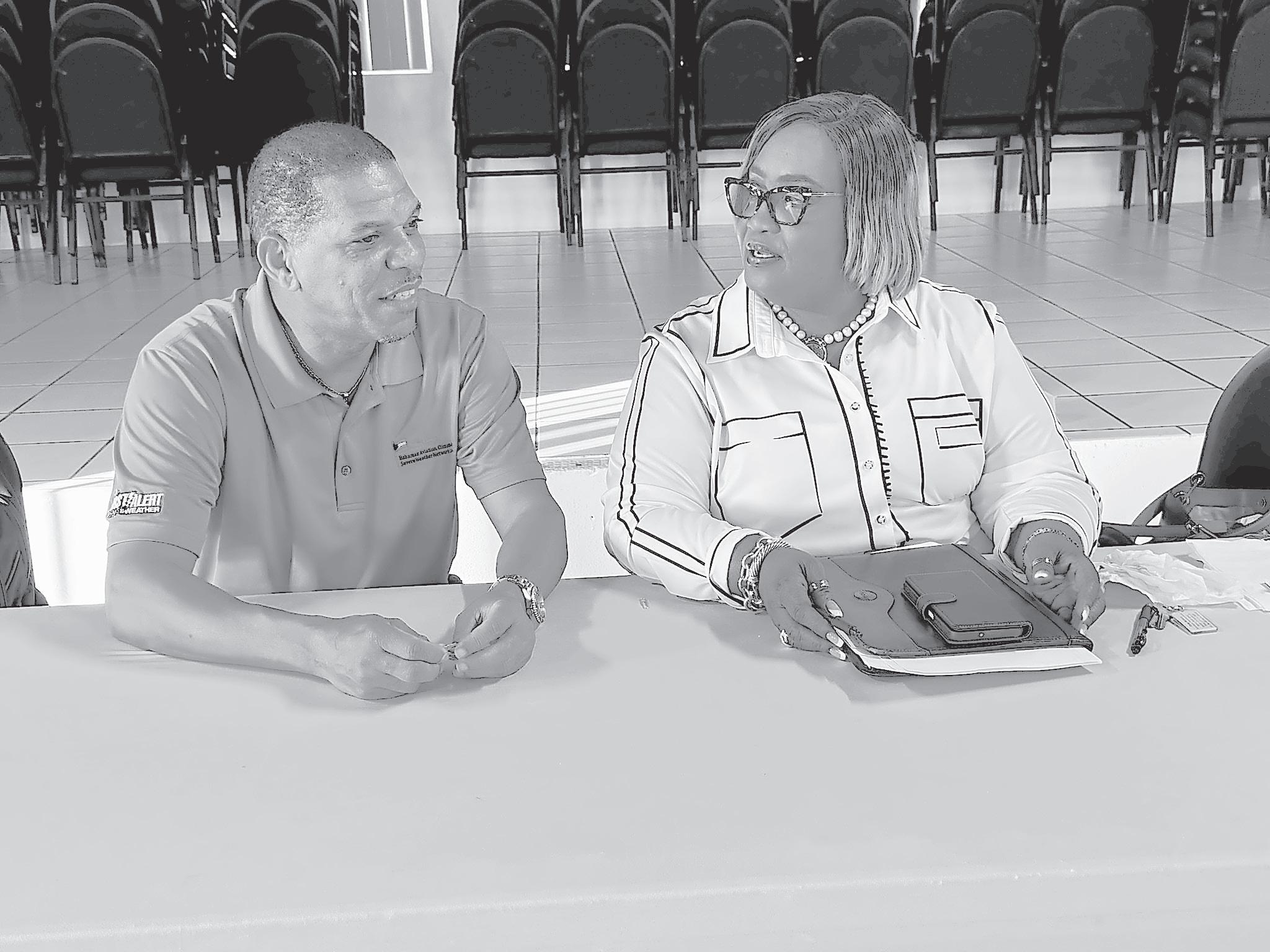




By PAVEL BAILEY Tribune Staff Reporter pbailey@tribunemedia.net
A MAN charged with murder has been granted bail after spending more than three years in prison awaiting trial - despite strong objections from the prosecution. Alexander “Alex” Sands, 24, was released on $20,000 bail by Justice
Jeanine Weech-Gomez, who noted the case had been delayed until August 2026, well beyond the three-year period Parliament considers reasonable for a person to be held without trial. Sands is accused of fatally shooting Lavandro Paul in New Providence on July 10, 2022. Paul later died in hospital on December 17, 2022.
During the bail hearing, prosecutor Desiree Ferguson objected to his release, arguing that Sands was allegedly affiliated with a gang and should remain in custody both for his own safety and to preserve public order. She warned that his release could heighten the risk of retaliatory violence and said the seriousness of the offence
By PAVEL BAILEY Tribune Staff Reporter pbailey@tribunemedia.net
A 25- YE A R-O LD
man awaiting trial on two counts of incest was remanded to prison yesterday after prosecutors accused him of failing to sign in at his local police station for
186 days — almost two years in breach of his bail conditions. Prosecutors told the court the man repeatedly missed mandatory checkins between December 14, 2023, and September 29. He pleaded not guilty to violating his bail conditions when he appeared
before Senior Magistrate Kara Turnquest-Deveaux, who denied him further bail and ordered him remanded to the Bahamas Department of Correctional Services. His trial on the incest charges is scheduled to begin December 3. He was represented by Levon Johnson.
made him a potential flight risk. Sands denied the allegations, insisting there was no evidence linking him to the killing. He maintained his innocence and argued that there was no written statement from the deceased or contemporaneous record identifying him in a photo lineup. He told the court he would abide by any
bail conditions imposed. In granting bail, Justice Weech-Gomez acknowledged Sands had twice been denied bail before but said the lengthy delay in his trial weighed heavily in her decision.
As part of his release terms, Sands will be fitted with an electronic monitoring device and must observe a 6pm to 6am curfew. He is required
to sign in at the Central Police Station every Monday, Wednesday, and Friday by 6pm, surrender his travel documents, and stay at least 100 feet away from prosecution witnesses. He must also surrender himself into custody on the Monday his trial begins. Nathan Smith represented the accused.
64-YEAR-OLD ACCUSED OF VEHICULAR M ANSLAUGHTER IN ACCIDENT THAT KILLED 36-YEAR-OLD MOTORCYCLIST
By PAVEL BAILEY Tribune Staff Reporter pbailey@tribunemedia.net
A 64-YEAR-OLD man accused of causing a fatal crash on Carmichael Road that claimed the life of a 36-year-old father was remanded to prison yesterday. Police allege Tyrone Newbold was driving east near Edmonton Lane around 6.36pm on August 1 when his vehicle collided with Ashley Williams’ motorcycle. Williams died at the scene, leaving behind a fiancée and three children. Newbold was not required to enter a plea when he appeared before Senior Magistrate Shaka Serville on a charge of vehicular manslaughter.
The case will be transferred to the Supreme Court for trial through a voluntary bill of indictment (VBI). He was advised of his right to apply for bail in the higher court and remanded to the Bahamas Department of Correctional Services until the VBI is served on February 23, 2026. Inspector Deon Barr prosecuted.
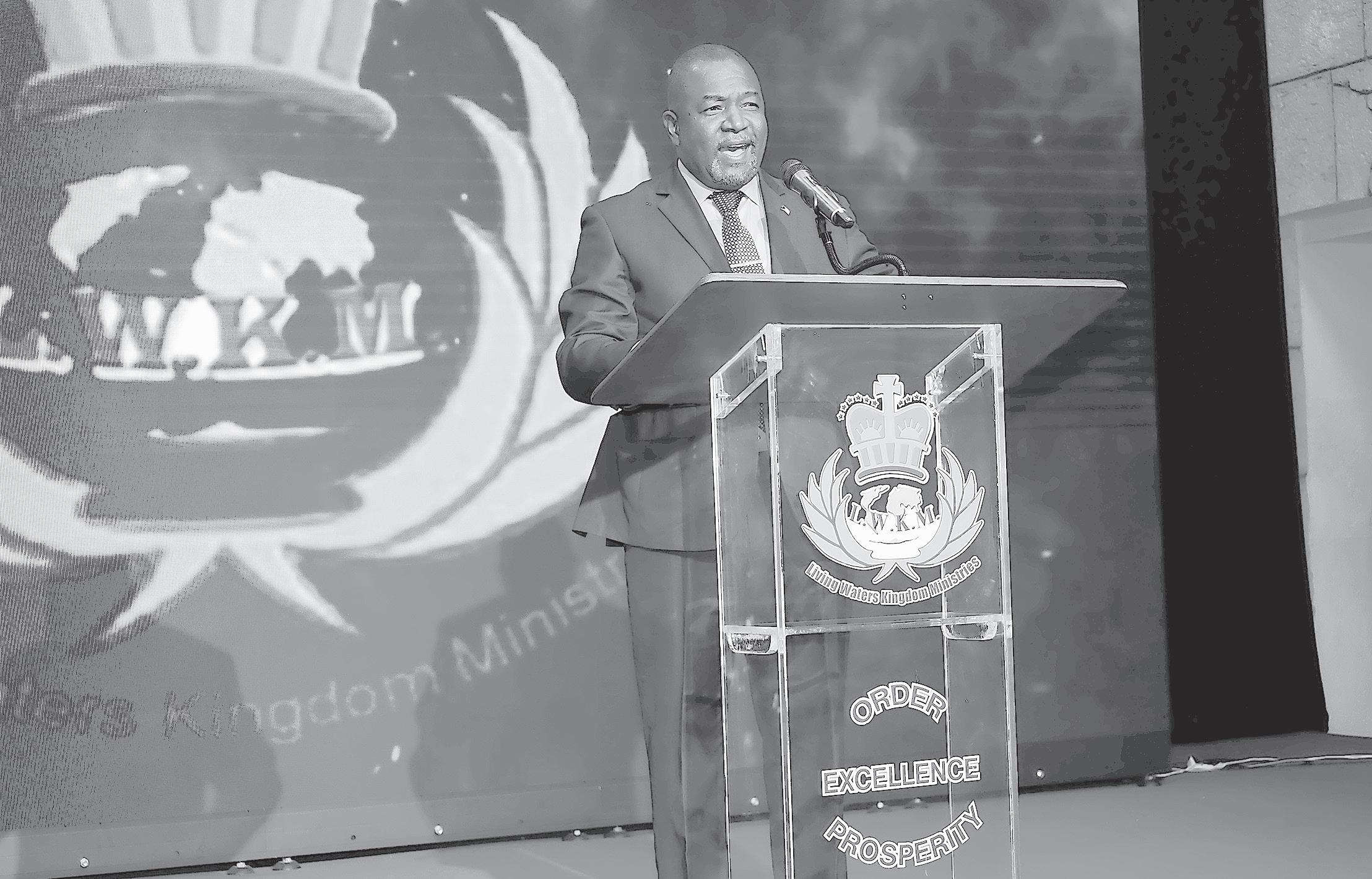

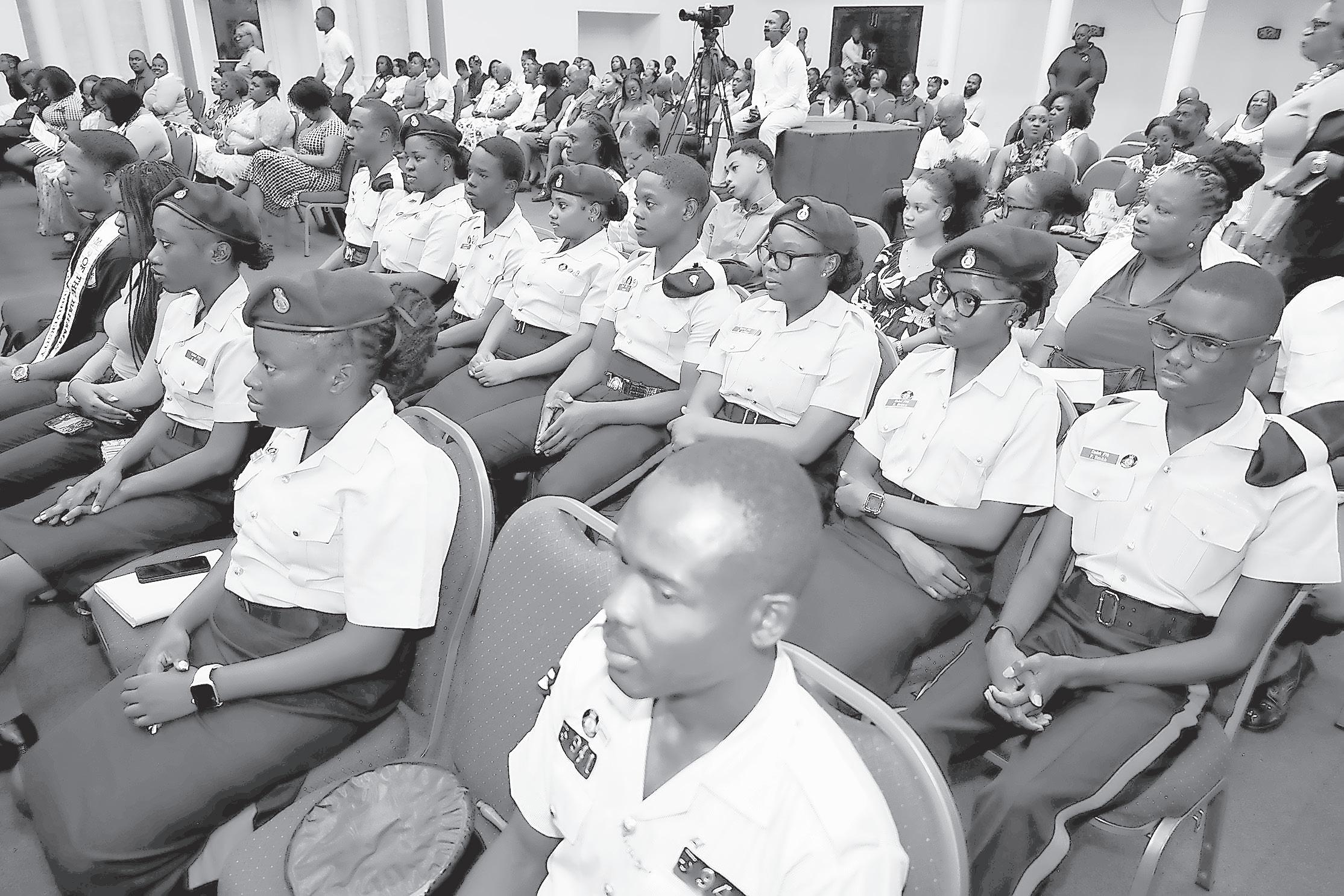

A QUIET war rages in the hearts and minds of those we trust most—the police officer patrolling our streets, the teacher shaping our children, the doctor holding a life in their hands, the politician entrusted with a nation’s fate. They wear uniforms, titles, and authority, but beneath the symbols of power, there is the same shared vulnerability of the human mind, capable of compassion, cruelty, service or self-interest.
The question that demands our attention is this: What happens when the minds behind authority are unexamined, unstable, or unchecked? The answer is not despair, but the potential for positive change. The consequences are dire when those in power lack emotional maturity, self-awareness, and empathy. Chaos quietly brews in classrooms, hospitals, police stations, and parliaments, undermining the very fabric of our society. There have been enough incidents to tell us that something is not right. What are we waiting for?
The police offcer: The uniform and the ego
A police officer is expected to embody justice and restraint. They face the rawest edges of humanity daily—violence, deceit, desperation, and grief. But what toll does this constant exposure take on their psyche? How does one remain calm, patient, and objective when every encounter could turn fatal?
Policing demands not just physical courage, but also emotional intelligence. Yet, our current recruitment and training practices often prioritise authority, obedience, and control, neglecting the crucial aspects of emotional regulation, empathy, and community engagement.
When a police officer’s identity fuses with the uniform, when respect becomes something to demand rather than earn, the line between protector and predator blurs.
A police officer dealing with a drunk, a mentally ill person, or a frightened teenager is not merely enforcing the law; they are testing their own humanity. The difference between peacekeeping and oppression often lies not in the law but in temperament— the ability to absorb insult without retaliation, stand firm without humiliation, and wield power without losing humility.
When officers use authority to mask insecurity or exert dominance, the system breeds not safety, but fear when that temperament is missing.
An emotionally unstable officer with a weapon and a badge is not a guardian; they are a potential threat. Too many, especially young officers, have no idea what rational means.
The teacher: Carrying the burden of two worlds
If the police officer deals with crime, the teacher deals with innocence— though often innocence lost too soon. Teachers are the quiet soldiers of civilization, standing between ignorance and enlightenment, chaos and hope. But they, too, are human beings who bring their personal wounds into the classroom.
A teacher’s mental and emotional state affects every child in their care.
A teacher suffering from burnout, depression, or resentment can unintentionally transmit their turmoil to a classroom full of impressionable minds. When a teacher lacks emotional balance, children pay the price.
Worse still, many teachers face overwhelming social and psychological pressures: inadequate pay,


BY
administrative scrutiny, parental expectations, and the weight of managing classrooms filled with children from fractured homes, trauma, or neglect. How can a teacher build patience when the world offers none to them? The children are taking notes. Teaching is not just a job—it is a moral calling. A teacher must be emotionally literate and able to see beyond behaviour to the pain beneath it. The child acting out may be hungry, scared, or unloved. The silent child may be carrying burdens beyond comprehension. When teachers forget this or their own unresolved anger spills into the classroom, the result is not education, but emotional damage disguised as discipline.
A teacher’s authority should never become a weapon to humiliate. Their role is to elevate, not dominate.
The doctor: Under the knife of pressure
The medical profession sits at the crossroads of science, ethics, and human fragility. Doctors are entrusted with the ultimate responsibility—to decide who lives and dies, who gets treatment and who doesn’t, how resources are allocated, and how to deliver hope when hope is nearly gone. We rarely talk about the mental toll this constant proximity to suffering exacts. Doctors are expected to be infallible— never to waver or err. But beneath the calm of clinical detachment, many are crumbling under enormous emotional strain. Depression and burnout among physicians are among the highest of any profession. What happens when a doctor’s exhaustion hardens into apathy? When does the empathy that once fueled them give way to cynicism? Patients stop being people and
become “cases”. Decisions turn mechanical, compassion fades, and medicine devolves into procedure rather than care.
The public expects doctors to be gods, but humans are drowning in impossible expectations. And yet, with great power comes great responsibility—to remain sober in judgment, humble before uncertainty, and kind even in crisis. When doctors forget this sacred covenant, when arrogance replaces empathy or detachment becomes indifference, the result is cruelty dressed in clinical language.
The politician: Power without refection
If police officers hold power over liberty, teachers over knowledge, and doctors over life, politicians have power over all three. And yet, the political arena often attracts precisely those least fit for moral leadership: individuals driven by ego, ambition, and manipulation rather than wisdom, patience, or vision.
We entrust them with the keys to our collective future. But how often do we ask: Are they emotionally stable? Are they guided by conscience or vanity? Are they truly capable of listening and governing with empathy rather than control?
Politics, at its best, should be the art of service; at its worst, it becomes the theatre of self-interest. A politician with an unstable mind can destabilize nations. Their words can ignite hatred or heal division, their decisions can destroy economies or save lives.
Sobriety of mind is not optional—it is essential. Every impulsive outburst, every vindictive policy, every act of greed ripples outward, affecting everyone. The politician’s responsibility is to legislate wisely and embody composure and dignity under pressure.
Yet, how often do we see the opposite? Leaders mistake authority for superiority. They weaponise power to silence dissent and reward loyalty over integrity. In doing so, they create chaos—not just in governance but in the very soul of society.
Authority without empathy: The recipe for chaos
Whether it’s a police officer, teacher, doctor, or politician, the common thread is authority. And authority, when coupled with immaturity or emotional instability, is a
dangerous combination. Authority without empathy becomes tyranny. Power without patience becomes abuse. Control without compassion becomes cruelty. Each profession demands emotional intelligence, yet too rarely nurtures the ability to selfregulate, perceive others’ pain without judgment, and act not from ego but from principle. We talk endlessly about qualifications, ranks, and regulations. But what about the mind? Shouldn’t emotional screening be as critical as technical training? Shouldn’t those who hold authority over lives, minds, and freedoms be required to demonstrate mental stability, self-awareness, and a proven capacity for restraint?
A society that neglects the mental health of its gatekeepers invites disaster. The consequences are all around us: teachers breaking down, doctors walking out, police officers lashing out, politicians burning bridges.
The hidden epidemic of authority fatigue
We live in an age of emotional exhaustion. Public servants are under siege from impossible expectations, shrinking resources, and a lack of social respect. The very people who should embody calmness are being consumed by stress. The result is authority fatigue, the burnout of those responsible for maintaining social order. It manifests as irritability, indifference, or aggression. When unchecked, it festers into cynicism and cruelty. A burned-out officer stops caring about the community. A weary teacher stops believing in students, a fatigued doctor stops listening to patients, and a jaded politician stops serving the people.
Authority fatigue is not just a personal issue but a public crisis. When those in positions of power lose emotional balance, the systems they uphold begin to fracture. The law becomes punitive. Education becomes oppressive. Medicine becomes mechanical. Politics becomes toxic.
The discipline of dignity
The antidote to this creeping decay is dignity—the discipline of treating others with unwavering respect regardless of status or circumstance. It is easy to be polite to the powerful and dismiss the powerless. True dignity lies in doing the opposite— showing patience with the
problematic, compassion for the broken, and respect for the unseen.
A police officer who arrests with courtesy restores faith in justice.
A teacher who disciplines with empathy builds resilience in children. A doctor who comforts as well as cures heals beyond medicine. A politician who listens instead of lecturing earns the nation’s trust. These are not sentimental ideals. They are the building blocks of civilization. When dignity disappears, society descends into mistrust and resentment. Authority becomes something to fear, not respect.
The moral weight of authority
Every position of authority carries a moral weight. To hold power over another human being is to have their vulnerability in your hands. That power must never be used to control, humiliate, or exploit. Across institutions, abuses of power remain rampant. The police officer who enjoys intimidation, the teacher who humiliates a struggling child, the doctor who mocks a patient’s ignorance, and the politician who uses fear to manipulate voters are not isolated incidents—they are symptoms of a deeper moral illness: the loss of reverence for responsibility. Authority should be a service, not a privilege. Those who wield it must cultivate humility, not hubris. Because the greater the power, the greater the moral restraint required to wield it wisely.
Tolerance, patience, and the art of listening
At the heart of all healthy authority lies tolerance—the ability to coexist with difference—to meet anger with calm, ignorance with understanding, and defiance with grace.
Tolerance is not weakness; it is strength under control. Patience is not passivity; it is wisdom in motion. Politeness is not subservience but the highest form of respect for oneself and others.
Imagine a world where those in authority practised these virtues not as formalities but as moral imperatives: a police officer who pauses before reacting, a teacher who listens before judging, a doctor who explains before prescribing, a politician who consults before commanding. These small acts of patience build the foundation for a just and humane society.
The catastrophe of neglect
When authority forgets its moral foundation, chaos follows.
We see it in the streets, where citizens fear the police more than crime.
We see it in classrooms, where students learn obedience but not curiosity. We see it in hospitals, where efficiency replaces empathy.
We see it in parliaments, where power has replaced principle, when the mind behind authority decays, institutions rot from within. The result is a cynical, mistrustful society where respect is coerced, not earned. Yet, we cannot rebuild trust merely through policy or punishment. Psychological reform is needed—a collective reawakening to the mental and emotional duties of leadership.
The call for emotional accountability
We must start treating emotional stability as a professional qualification. A police officer should be evaluated for marksmanship and emotional control. A teacher should be assessed not only for curriculum mastery but for compassion. A doctor should be trained not only in diagnosis but in empathy. A politician should be judged not by slogans but by integrity and restraint. The future of a civilised society depends on the mental hygiene of its leaders. Those who cannot control themselves cannot be trusted to control others.
The sacred responsibility of power
The mark of true maturity is not dominance but discipline, not control but composure, not authority but accountability. We cannot afford emotionally unstable custodians of justice, education, health, or governance. The stakes are too high. A police officer’s misjudgment can end a life. A teacher’s cruelty can scar a soul. A doctor’s indifference can end a future. A politician’s recklessness can destroy a nation. The mental state of those in power or seeking power is not a private matter but a public concern. Every badge, stethoscope, chalk, or ballot should come with a vow: to serve with patience, humility, and humanity, because authority, when stripped of empathy, becomes tyranny.
Facing Reality, the measure of a society is not how it treats its powerful, but how the powerful treat everyone else.
PARIS Associated Press
FRENCH Prime Min-
ister Sébastien Lecornu resigned after less than a month in office on Monday and less than 24 hours after naming a new government that prompted a key coalition ally to withdraw support.
The move deepened the country’s political crisis and left President Emmanuel Macron with few options.
The presidency said that Macron, who has been hitting record lows in opinion polls, accepted the resignation.
Lecornu had replaced his predecessor, François Bayrou, on Sept. 9 to become France’s fourth prime minister in barely a year during a prolonged period of political instability. Lecornu is now the shortest-serving prime minister in the history of the Fifth Republic, which started in 1958.
French politics have been in disarray since Macron called an early legislative election last year that produced a deeply fragmented National Assembly.
Far-right and left-wing lawmakers hold more than 320 seats in the lower house, while the centrists and allied conservatives hold 210, with no party having an overall majority.
Lost support
Despite more than three weeks of efforts to secure enough support to avoid a no-confidence vote, Lecornu was forced out just hours after forming his Cabinet on Sunday, having lost the support of conservatives who hold 50 seats and who objected to his choice for defence minister.
Lecornu’s government will manage day-to-day affairs until a new prime minister and Cabinet are appointed. It’s now up to Macron either to name a new head of government or to dissolve the National Assembly and call an early legislative election.
Macron’s office announced Monday evening that he has asked Lecornu to hold more “final negotiations” over the next two days in the interest of national stability — suggesting a

potential second chance for Lecornu to stay and attempt to form a new government. The brief statement gave no additional details.
Lecornu, a faithful ally of Macron, responded that he agreed to hold final talks with political forces “for the country’s stability” and that he would tell him on Wednesday evening “if it’s possible or not, so that he can draw all the necessary conclusions.”
Lecornu previously said that conditions were no longer met to remain in office after failing to build a consensus.
He said that he believed the new government could have succeeded with just a little more work and if the coalition partners had only been a bit more “selfless,” in an apparent jab at Bruno Retailleau, the head of the conservatives.
“One must always put one’s country before one’s party,” Lecornu said.
Macron the main target
With less than two years before the next presidential election, Macron’s opponents immediately tried to capitalize on the shocking resignation, with the farright National Rally calling on him to either call for another early parliamentary election or resign.
“This raises a question for the President of the Republic: can he continue to resist the legislature dissolution? We have reached the end of the road,” far-right leader Marine Le Pen said. “There is no other solution. The only wise course of action in these circumstances is to return to the polls.”
On the far left, France Unbowed also asked for Macron’s departure, while voices on the left called for the revival of a coalition made up of leftists, socialists, greens and communists.
The resignation rattled investors, sending the CAC-40 index of leading
French companies plunging. The index fell by nearly 2% in the wake of the resignation before later making up some of the losses.
Ministers appointed just the previous night found themselves in the bizarre situation of becoming caretaker ministers — kept in place only to manage day-to-day affairs until a new government is formed — before some of them had even been formally installed in office.
Agnès Pannier-Runacher, the newly reappointed minister for ecology, posted on X: “I despair of this circus.” Lecornu’s method didn’t work
Other key positions remained largely unchanged from the previous Cabinet, with Retailleau staying on as interior minister in charge of policing and internal security, Jean-Noël Barrot remaining as foreign minister and Gérald Darmanin keeping the justice ministry.
Retailleau, the head of the conservative Republicans party, said that he didn’t feel responsible for Lecornu’s fall, despite lashing out at the composition of the new government.
Retailleau blamed Lecornu for not letting him
Lecornu’s choice of ministers has been criticized across the political spectrum, particularly his decision to bring back former Finance Minister Bruno Le Maire to serve at the defence ministry, with critics saying that France’s public deficit soared under his watch. Lecornu’s main task would have been to pass a budget, as France is faced with a debt crisis. At the end of the first quarter of 2025, France’s public debt stood at 3.346 trillion euros ($3.9 trillion), or 114% of gross domestic product. Debt servicing remains a major budget item, accounting for around 7% of state spending.
know Le Maire would be part of the government.
“It’s a matter of trust,” he told broadcaster TF1. “You promise a break and end up with returning horses. This government embodied all the conditions to be censured.”
Le Maire said that he offered Macron his immediate withdrawal from the government, a proposal that the president accepted.
“I hope this decision will allow talks to resume to form the new government France needs,” he said. Seeking consensus at the National Assembly, Lecornu consulted with all political forces and trade unions before forming his Cabinet. He also vowed that he wouldn’t employ a special constitutional power that his predecessors had used to force budgets through parliament without a vote and would instead seek compromise with lawmakers from the left and the right.
By SARAH RAZA Associated Press
A DEADLY tornado that tore across southeastern North Dakota this summer has been upgraded to an EF5 with winds topping 200 mph (322 kph), the strongest classification of tornado and the first confirmed on American soil in a dozen years, meteorologists said Monday.
The June 20 twister near the town of Enderlin killed three people and at its largest was 1.05 miles wide (1.7 kilometres), carving a path across the prairie for just over 12 miles (19 kilometres). Meteorologists from the National Weather Service office in Grand Forks estimated the tornado’s winds reached 210 mph (338 kph), according to the newly released analysis.
The 1999 Bridge Creek-Moore tornado in Oklahoma holds the record of the strongest winds ever recorded in the US at 321 mph (517 kph). Since the National Weather Service began using Enhanced Fujita scale in 2007, there have been 10 tornadoes categorized as EF5. The 12-year gap between topof-the-scale ratings is the longest since the agency started keeping records in 1950. The earlier tornadoes were assessed using an older version of the EF scale called the Fujita

scale. “In the last kind of 12 years, there’s been several strong tornadoes that have come close, but there haven’t been known damage indicators at that time to support the EF5 rating,” said Melinda Beerends, meteorologist in charge at the National Weather Service in Grand Forks.
“It’s hard sometimes to get tornadoes to hit
something,” she said.
The morning after the EF5 tornado, meteorologists from the Grand Forks office headed into the field to assess the damage. They studied how the twister had uprooted trees, tipped over fully loaded rail cars, toppled transmission towers and destroyed farmsteads, including one that had its foundation swept clean with just the basement remaining.
“The city of Enderlin, other than losing power, pretty much went unscathed,” said Mayor Deon Maasjo. Two men and a woman were killed at two locations east of the town, which is about 40 miles (65 kilometres) southwest of Fargo.
Determining a tornado’s strength usually takes days or weeks, as meteorologists study the damage to buildings and trees. This
case took much longer because of the unusual damage to rail cars, including one that was picked up and hurled far from the rest. The meteorologists worked with engineers and wind damage experts to conduct additional surveys and forensic analysis to determine the EF5 rating, up from the initial estimate of EF3. The tornado was caused by warm, moist air in a
place that’s ripe for a thunderstorm, Beerends said. But there was also a high amount of wind shear, which is a variation of wind speed and direction that created the conditions for the tornado.
In recent years, tornadoes have been occurring with greater frequency east of the Mississippi River, said Victor Gensini, professor of atmospheric sciences at Northern Illinois University.
“If you look 40 to 50 years ago, the tornadoes that were happening in places like Texas, Oklahoma and Kansas are kind of happening there with less frequency, and we’re seeing more tornadoes in places like Birmingham, Little Rock and Memphis,” he said.
Though meteorologists aren’t sure what’s causing the trend, the higher frequency of tornadoes in the Mid-South and Midwest is notable because it’s closer to population centres, Gensini said, so there’s a greater chance a tornado may hit something.
The last recorded EF5 tornado was on May 20, 2013, in a town outside Oklahoma City, killing 24 people and injuring more than 200 others. That tornado tore through hundreds of homes, a school, hospital and bowling alley in Moore, where nearly a decade later, droves of moviegoers lined up to watch the 2024 film “Twisters.”
“BTVI is more than just a workplace for me. It’s a place where we help build a stronger community and contribute to a better Bahamas through education and empowerment.”
These are the words of Kayla Johnson, Admissions Officer at Bahamas Technical and Vocational Institute (BTVI), Grand Bahama Branch Campus.
Ms Johnson’s comments come on the heels of BTVI becoming the first higher education institution in The Bahamas and the region to receive international accreditation with the Council on Occupational Education (COE). BTVI is also seeking accreditation with the National Accreditation and Equivalency Council of The Bahamas (NAECOB).
Ms. Johnson plays a key role in the admission of students. An employee of 12 years, her work with BTVI began at the New Providence Main Campus in 2013. Three years later, she transferred to the Grand Bahama Branch Campus, serving there for the past nine years.
Clearly distinguishing herself among employees at the BTVI Grand Bahama Branch Campus, Ms. Johnson won the 2019 Employee Excellence Award and Staff Award of Excellence in 2022 and 2025. Few people can boast of winning the top employee award on multiple occasions.
“When you truly enjoy what you do, you don’t seek

recognition or wonder if others notice your efforts. Instead, you work with humility, knowing that your dedication speaks for itself. Over time, your passion can inspire colleagues, encouraging them to stay motivated and follow your example,” said Ms. Johnson.
Ms. Johnson said the secret sauce for her multiple awards has been good customer service.
“Always have the passion to provide exemplary service, not only to your primary customers—the students—but also by being a supportive team player to your colleagues. Excellence comes from serving with heart and working together with purpose,” she stated.
Acknowledging the work of her Admissions teammates in helping to grow student numbers year after year, Ms. Johnson noted the importance of building meaningful relationships.
“You have to genuinely love working with people. Also, when it comes to recruiting, it’s essential to understand your target audience; knowing who they are, what they need and how best to connect with them makes
all the difference,” stated Ms. Johnson.
BTVI currently has 3,048 students, not including customised programmes and Professional Development Courses, across its seven sites with 576 in Grand Bahama.
“I find great fulfillment in recruiting students and supporting them throughout their entire journey at BTVI. Knowing that I’ve played a meaningful role in their educational and personal development is both rewarding and motivating,” she said.
Additionally, Ms. Johnson challenges outdated perceptions about technical and vocational education.
Over a decade in the field has revealed the transformative impact of skills-based learning not just for individuals, but for entire communities.
“Working at a technical institution has shaped my perspective and helped dispel the myth that technical education is only for students who are not academically inclined. At BTVI, our mission is to provide learning opportunities that empower students to become globally competitive and economically independent,” she stated.

YOUNG leaders from across
The Bahamas were celebrated this week as the 2024/2025 Local Government Junior Council Awards recognized the nation’s top-performing student councils.
Taking the top spot was Mary Star of the Sea Catholic Academy, proudly representing Grand Bahama for a second consecutive year.
In a remarkable show of student leadership, Inagua All-Age and Mayaguana All-Age schools tied for second place, while Jack Hayward Junior High School secured third. Honourable mentions went to Sister Mary Patricia, St. Georges High, and Sunland Baptist Academy for their outstanding participation and spirit.
Students from Grades 7 to 12 across 47 public and private
schools participated in the Junior Council Programme, which challenges them to take on leadership roles, simulate the electoral process, and engage in real-world governance at the local level.
First place winners received $5,000; second place, $3,000; and third place, $2,000. Honourable mention schools were awarded $500 each for their impressive efforts.
The initiative aims to cultivate a sense of civic duty and democratic involvement among students, encouraging them to campaign, vote, and serve just as elected officials do.
Nomination Day for the 2025 Junior Council elections is set for Wednesday, October 8, with national elections to follow on Thursday, October 16.





